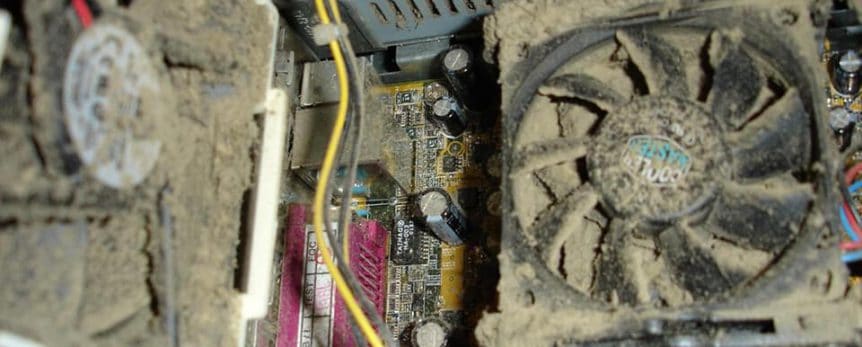Quietly running in the corner, inside the cabinet or in a specific rack, electronic components require a continuous airflow to keep cool. Funny that though overtime that very airflow brings something that is the death of any integrated circuit. A fine layer of dust! Vents that are clogged with fluff, hair, a slightly greasy, sticky layer of residue from the very plastics that surround it.
Just like any other mechanical item, the main engine, your car, the gas-powered water heater, electronics should have a regular check-up. And more importantly it needs to be kept clean.
Computers are some of the most efficient dust collectors known to humankind! Aside from this looking gross and actually being an allergy hazard, a dusty computer will trap heat. Just like a car needs clean oil to keep the engine from overheating, your AV and IT equipment need clean cool airflow to prevent overheating. Failure to do this will reduce their performance and their lifespan.
Aside from dusty fans being noisier, overheating audio amplifier with clogged vents will experience a significant degrade the audio sound. Cables that are not tied away and left to become a rat’s nest also contribute to reduced performance by not allowing the electronics to emit their heat efficiently. Electrical circuits with dust covered will cause arcing and can cause tiny sparks that cause damage to any of the integrated circuits, aside from it becoming a fire hazard.
Aging electronics will degrade more rapidly, and even a slight layer of dust on heatsinks and across components will absorb more moisture, especially with the higher humidity of especially corrosive salty air onboard of vessels. Power supplies units especially are prone to fail due to their constant use in poorly ventilated spaces.
So, keeping electronics clean and well ventilated is crucial for extended life of the units. And considering the price tag placed on many of these components that are tightly packed into the racks, a periodic check-up is well worth the time.
Make sure that your AV & IT integrator has left you with a proper schedule of tasks that you should do periodically. Simple tasks like ensuring that ventilation grills are kept free of dust can easily be done with compressed air. A weekly check to ensure that the spaces where the electronics are kept are not overheating, and that cables are securely fitted will give enormous pay back over time.
If time is always escaping you, and preference is set that this is looked after by an external professional, with remote monitoring systems this can also easily be done. In more complex setups a pro-active outside eye will pick up failure points long before they become of a drama onboard causing delays and disgruntled guests, the last thing any crew will want.
If you can find the time yourself, you will find countless articles on the internet about methods to use to clean your electronic components. But remember that electronics are very sensitive to static discharges, and even slightest damage to circuit boards will render systems useless. In the end never hesitate to ask if you are unsure. The biggest issues may be resolved by the simplest of answers.
This article was written by Tim Gorter, teletechnics.com. Tim specialises in troubleshooting support and analytic maintenance. He also provides full shoreside support to vessels running without an ETO onboard, providing full remote monitoring or just simple advice.


